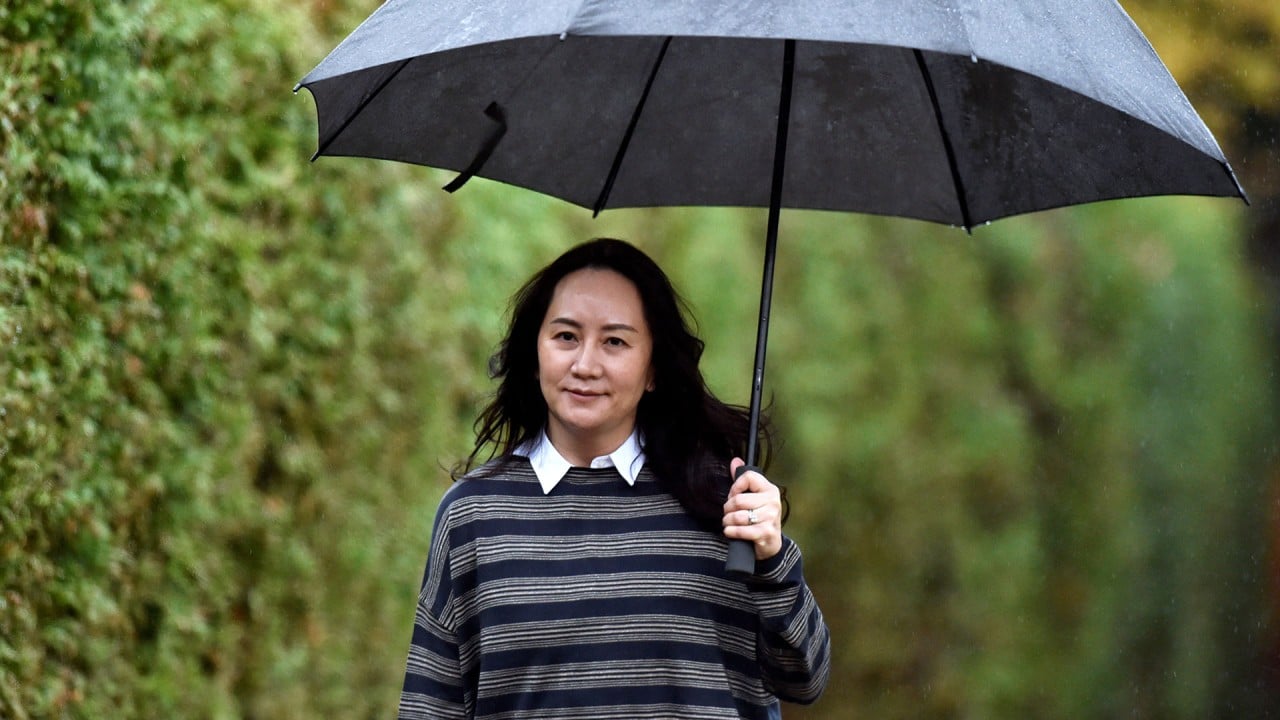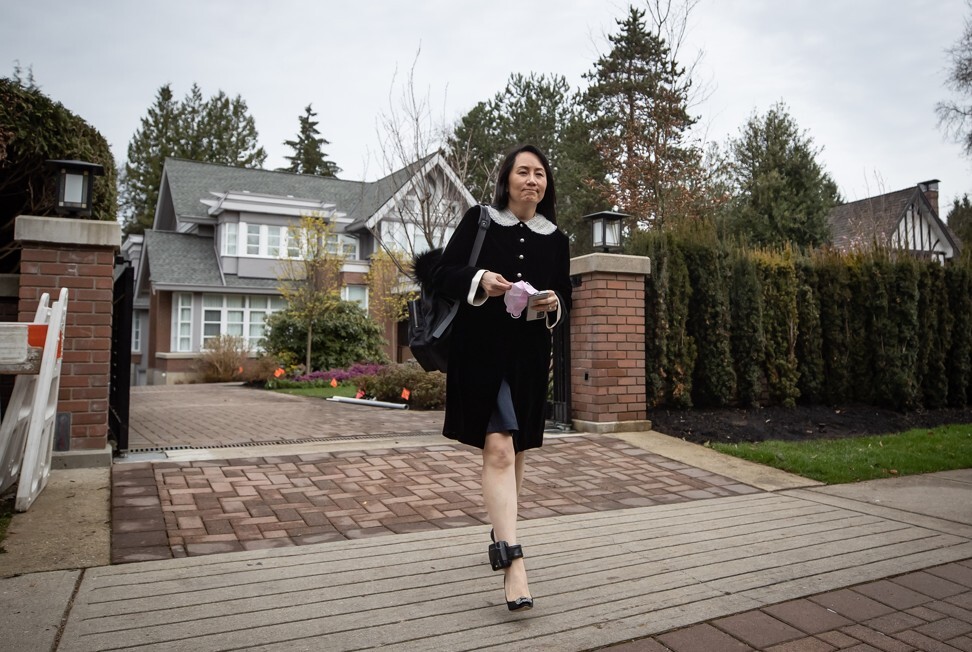
Meng Wanzhou’s extradition judge should not decide on US jurisdiction, Canadian government lawyer says
- Robert Frater says jurisdiction over fraud charges against the Huawei executive is a matter for Canada’s justice minister and a US trial to decide
- He alleges that lies by Meng in a Hong Kong teahouse had the consequence of legal risk taking place in the US
The judge in Meng Wanzhou’s extradition case has been told by Canadian government lawyers that she has no business ruling whether the United States has jurisdiction to bring its fraud charges against the Huawei Technologies executive, and that the issue should be left to Canada’s justice minister and an American trial.
Meng’s lawyers had spent more than three days and filed seven expert reports by law professors and others to argue their case in the Supreme Court of British Columbia, that the US has no standing to bring the charges, that it was acting contrary to international law and that Associate Chief Justice Heather Holmes should therefore stay the extradition hearing and release Meng.
But in his reply on Thursday, the Canadian Department of Justice’s top lawyer, Robert Frater, representing US interests in the case, told the judge that jurisdiction was “not a matter for you at all”.
He said that Meng’s lawyers’ “eloquently presented” argument was made up of “flaws that run so wide and so deep that I scarcely know where to begin”, namely that Canada’s extradition legislation and Supreme Court of Canada rulings had established jurisdiction as a consideration for the executive branch of government and foreign courts, not a Canadian extradition judge.

“[Questions] concerning a requesting state’s jurisdiction to prosecute are primarily for the foreign trial court; to the limited extent that they may be raised here, they are for the Minister of Justice at the surrender phase of the proceedings,” Frater and colleagues said in a written submission.
“The weight of jurisprudence … clearly directs that this issue is expressly not for the committal judge,” the submission concluded.
Frater’s team cited the Extradition Act, which states that the minister has discretion to refuse to surrender a suspect if “none of the conduct on which the extradition partner bases its request occurred in the territory over which the extradition partner has jurisdiction”.
[Meng’s] lies in the tea room have a consequence, the creation of legal risk taking place in the United States
Although Holmes can decide to free Meng, if the judge instead approves extradition, the final decision on sending Meng to face trial in the US will be made by the minister.
Meng, who was arrested at Vancouver’s airport on December 1, 2018, on a US extradition warrant, is accused of defrauding HSBC by lying to the bank in a 2013 meeting about Huawei’s business dealings in Iran. Meng’s lawyers say the US has no jurisdiction over her conduct because she is Chinese, HSBC is British and the meeting took place in a Hong Kong teahouse.
However, the United States has claimed jurisdiction on the basis of the so-called “dollar clearing” process, in which US-dollar transactions between non-US banks may involve transfers between their correspondent US banks. Meng’s representations are alleged to have resulted in about US$2 million in such transactions.
‘US laws do not apply in China’: new front opens in Meng extradition fight
It is a justification Meng’s lawyers say is “wholly insufficient and artificial” and which seeks to unlawfully extend US jurisdiction to the actions of Chinese citizens in Hong Kong.
But Frater quoted a 1994 Supreme Court ruling in which an extradition judge who made a decision based on jurisdiction had been found to have been “usurping the function of the executive”, and he “should not have considered the issue of territoriality or jurisdiction at all”.
“If that isn’t the full answer, nothing is,” said Frater, and that for Holmes to tackle the matter of jurisdiction would be to “legislate an authority you do not have”.

04:43
How the arrest of Huawei CFO Meng Wanzhou soured China's relations with the US and Canada
Supreme Court judge Gerald La Forest had ruled in the drug-trafficking case that “[the] issue of the jurisdiction of the requesting state and its organs to prosecute a crime is essentially a matter governed by the law of that state”, and “an extradition judge is not vested with the function of considering the jurisdiction of the requesting state to prosecute the offence”.
In his argument, Frater wrote: “It is hardly surprising that an alleged bank fraud by a telecommunications company with a global presence and dealings with a multinational financial institution involves allegations linked to several jurisdictions.”
To diminish the US connections to the alleged crimes was to take an “impoverished view of the facts of this case” and another “fatal flaw” in Meng’s arguments, he told Holmes.
Taking a narrow view of the case would draw a “road map to protect transnational crime”, Frater contended.
Canada judge ‘must rule’ if US jurisdiction covers Meng’s Hong Kong actions
“[Meng’s] lies in the tea room have a consequence, the creation of legal risk taking place in the United States … on a Canadian test, that is a real and substantial connection,” he said.
He said it was “manifestly unfair” on the US for Meng’s lawyers to claim that the prosecution breached international law without reference to the indictment or the wording of the US laws on which the prosecution was based.
“It is not done here because my friends know they can’t do it,” said Frater, adding that if Meng’s lawyers tried to get “down into the weeds” of foreign law, then Holmes would simply reject their claim as beyond the scope of a Canadian court.

Frater was dismissive of the expert evidence furnished by Meng’s lawyers, which he said did not take a full view of the case.
“The questions they asked their experts makes their views basically useless to you,” he told Holmes, adding, “when it comes to law professors, they are best viewed in their natural habitat, which is in the pages of law reviews.”
He called on the application to be dismissed.
We’ve all worked very hard to push this along as expeditiously as we can. Why? Because Ms Meng would like to go home
Meng’s lawyer William Smart had anticipated some of Frater’s arguments by saying earlier that ministerial discretion “is no remedy for the court’s failure to protect the integrity of its own process, and it’s no remedy to Ms Meng … who remains detained through that process”.
Smart added that courts “cannot delegate to and rely on the executive to control its process and its integrity”.
Later, in reply to Frater, another of Meng’s lawyers, Gib van Ert, denied that the “eleventh hour” nature of the arguments about jurisdiction and international law should weigh against their merits or “sincerity”.
“We’ve all worked very hard to push this along as expeditiously as we can. Why? Because Ms Meng would like to go home,” he said.
The hearing was adjourned until April 26.
Thursday was the last day in a three-week block of hearings, most of which were devoted to a separate claim that Meng’s rights were abused by Canadian police and border officers who allegedly conducted a covert criminal investigation of her to help the American FBI.
Canada had to arrest Meng, and it was not arbitrary, her lawyer says
In further branches of the abuse claim, Meng’s lawyers say that she is the victim of a political prosecution brought as leverage in the US trade war with China, and that US prosecutors provided the British Columbia court with misleading summaries of the case.
On Wednesday, van Ert had told the court that his client had not been subjected to arbitrary detention, and that Canada had had no option but to arrest her after it received the US request. However, her detention had now been revealed as unlawful, he said.
Meng’s arrest triggered upheaval in China’s relations with Canada and the US. Days later, China arrested Canadians Michael Kovrig and Michael Spavor, accusing them of espionage. In recent weeks, both have had closed-door trials that lasted only a matter of hours. No verdicts have been announced.
Canada has accused China of seizing the men as an act of hostage diplomacy and arbitrary detention in retaliation for Meng’s arrest.
Meng’s long extradition battle may be close to its end, with the final three weeks of hearings scheduled to conclude on May 14 before Holmes considers her decision. But appeals could last for years.

